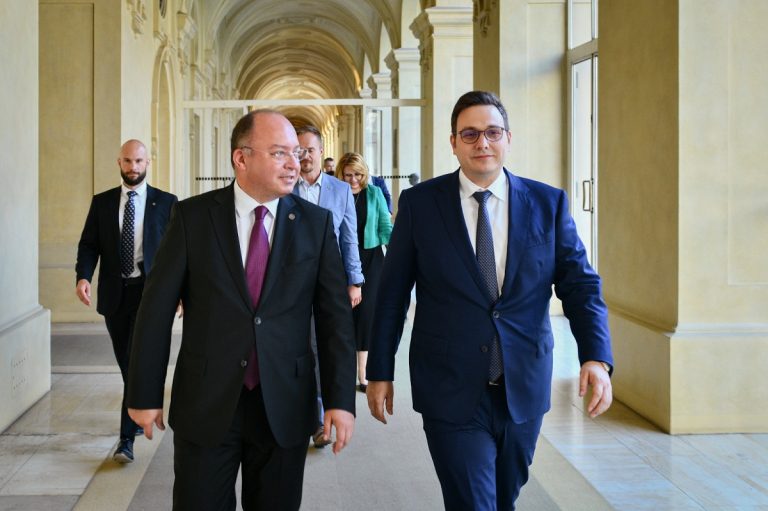Bogdan Aurescu and Jan Lipavsky in Prague yesterday. Credit: Jan Lipavsky via Twitter.
Prague, Aug 19 (CTK) – At a press conference in Prague yesterday, Foreign Minister Jan Lipavsky (Pirates) confirmed the Czech Republic’s support for Romania joining the Schengen Area, at a meeting with his Romanian counterpart Bogdan Aurescu.
Romania has met all Schengen criteria, according to Aurescu.
Czech Prime Minister Petr Fiala (ODS) said in July that during its current six-month EU presidency, the Czech Republic would do everything it could to bring about a decision on the entry of Croatia into the Schengen Area. Croatia wants to join in January 2023.
“The Czech Republic has long supported Romania’s entry into Schengen. I welcome a certain breakthrough achieved on the European scene,” Lipavsky said, adding that he had told his Romanian counterpart that the Czech Republic would push for political discussions over Romania’s Schengen entry as soon as possible.
The fact that Romania has admitted a high number of refugees from Ukraine since the start of the Russian invasion shows that the country applies the standards for Schengen entry, Aurescu said. He added that he hoped progress would be reached in this agenda during the Czech EU presidency.
Romania is among the countries with the highest number of Ukrainian refugees fleeing the invasion of their homeland by Russia. Almost one million have fled to Romania, the highest number after Poland, Russia and Hungary, according to the UN High Commissioner for Refugees (UNHCR).
The Czech Republic, with a population of 10.5 million and over 400,000 refugees, is the country with the highest number of refugees per population.
The foreign ministers also debated the Russian aggression against Ukraine. Lipavsky said the Czech and Romanian positions are very similar in this respect.
He also thanked Romania for tackling the humanitarian consequences of the war in Ukraine and for its assistance with exports of Ukrainian corn to the world market.
The Czech Republic and Romania share the values of rule of law and human rights and both countries also cooperate in the security sphere, Aurescu said.
“We agreed today that we would send a new impulse not only to our political-military affairs on the ministerial and higher levels, but also within professional relations,” he noted. He mentioned the possibility of closer cooperation in the energy industry, transport of commodities, tourism and agriculture.
Asked by CTK about further participation in the 16+1 platform for cooperation of China with Central and Eastern European countries, both ministers agreed that they found no fundamental contribution in this format.
Latvia and Estonia withdrew from this cooperation framework a week ago.
“We are revising our policy towards China,” Lipavsky noted.
The Foreign Ministry told CTK earlier that unfulfilled expectations led to taking all possibilities of work in this platform into consideration.
Aurescu agreed: “This initiative was outlined as an economic grouping only, but then we saw that it had started becoming more and more political and ideological,” he said. However, he and Lipavsky did not call for a complete termination of cooperation within this platform.







